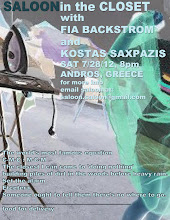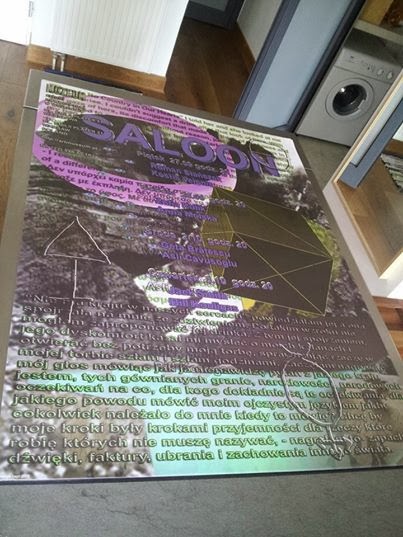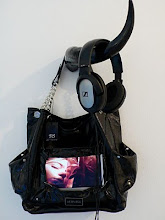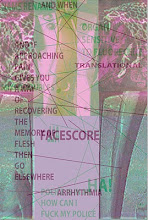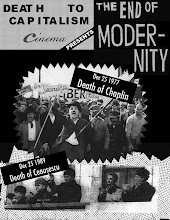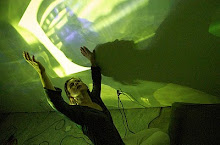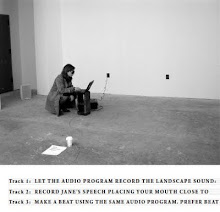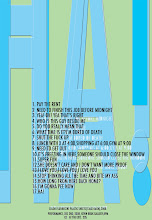“In the
very moment when he digests the object, the artist is digested by the society
that has already found a title and a bureaucratic occupation for him: he will
be the future engineer of entertainment, an activity that has no effect
whatsoever on the equilibrium of social structures. The only way for the artist
to escape co-optation is to succeed in unleashing a general creativity, without
any psychological or social limits. This creativity will be expressed in lived
experience.” Lygia Clark
How is to unleash a general creativity, forces which they could by definition, by character, by semotics slip beyond the capitalist paradigm? It is hard for us to sense that a lived experience it is the presence of bodies who touch, listen, hear and feel one another. The effort of a revolutionary today shouldn't be the production/consumption of the object, the text, the term, the idea that will only criticize the existing system, but the realization of the paradigm's shift, its possible existence in the present moment in her life. It is by the micro-revolutions: at her working place, with her family, her friends, at her neighborhood, by manifesting her need to speak, to listen, to create relationships, links, to refuse the bureaucratic scheme of a certain form and to be vulnerable. Always starting at the present moment beyond psychological and social limits: the shift then comes unexpectedly and it is not from the perspective of the what was and what it will be but the how it is now. It is more of a time declaration than a spacial one. [ When a child plays, when a lover courts, when an artist creates, they are not transmitting information but creating “a richly expressive situation in which a whole series of semiotic components are involved”*, temporarily freeing themselves from systems of expression that are founded upon the principle of individuation. Capitalism refuses to acknowledge the existence of these semiotic components, refuses to accept a mode of communication whose essence is desire. Instead, it wants, it requires people to express themselves in ways that are in accordance with the division of labor and only tolerates expressions of desire that the system can recuperate; capitalism demands that desire be “linearized, quantified in systems of production” and this is because “the best way for capitalism to insure semiotic subjugation is to encode desire in a linear way” In any given workplace, for example, workers are forced to abandon “the totality of what they are”, they must leave their desires and problems at the door. One’s desires and emotional life are completely ignored; workers are asked to work, not to be a desiring subject. Capitalism forces us all to suppress what we feel, and it refuses to acknowledge our “entire perceptive semiotics” in the name of productivity and profit. Capitalism forces us to take up a kind of identity which propagates the stultifying forms of social stratification that keep the bureaucratic-institutional machine in operation.] Revolutionaries today are those who create and who confront the institutional machine because they still claim the existence of communications whose essence is desire, ever thinking in terms of reaction but those of action.
[..] : segment from 'this is not a blog', microfascism, semiotic subjugation and collective arrangements of enunciation, posted on December 6, 2010
*quotes are from the 'A Thousand Plateaus, Capitalism and Schizophrenia, Gilles Deleuze and Felix Guattari
How is to unleash a general creativity, forces which they could by definition, by character, by semotics slip beyond the capitalist paradigm? It is hard for us to sense that a lived experience it is the presence of bodies who touch, listen, hear and feel one another. The effort of a revolutionary today shouldn't be the production/consumption of the object, the text, the term, the idea that will only criticize the existing system, but the realization of the paradigm's shift, its possible existence in the present moment in her life. It is by the micro-revolutions: at her working place, with her family, her friends, at her neighborhood, by manifesting her need to speak, to listen, to create relationships, links, to refuse the bureaucratic scheme of a certain form and to be vulnerable. Always starting at the present moment beyond psychological and social limits: the shift then comes unexpectedly and it is not from the perspective of the what was and what it will be but the how it is now. It is more of a time declaration than a spacial one. [ When a child plays, when a lover courts, when an artist creates, they are not transmitting information but creating “a richly expressive situation in which a whole series of semiotic components are involved”*, temporarily freeing themselves from systems of expression that are founded upon the principle of individuation. Capitalism refuses to acknowledge the existence of these semiotic components, refuses to accept a mode of communication whose essence is desire. Instead, it wants, it requires people to express themselves in ways that are in accordance with the division of labor and only tolerates expressions of desire that the system can recuperate; capitalism demands that desire be “linearized, quantified in systems of production” and this is because “the best way for capitalism to insure semiotic subjugation is to encode desire in a linear way” In any given workplace, for example, workers are forced to abandon “the totality of what they are”, they must leave their desires and problems at the door. One’s desires and emotional life are completely ignored; workers are asked to work, not to be a desiring subject. Capitalism forces us all to suppress what we feel, and it refuses to acknowledge our “entire perceptive semiotics” in the name of productivity and profit. Capitalism forces us to take up a kind of identity which propagates the stultifying forms of social stratification that keep the bureaucratic-institutional machine in operation.] Revolutionaries today are those who create and who confront the institutional machine because they still claim the existence of communications whose essence is desire, ever thinking in terms of reaction but those of action.
[..] : segment from 'this is not a blog', microfascism, semiotic subjugation and collective arrangements of enunciation, posted on December 6, 2010
*quotes are from the 'A Thousand Plateaus, Capitalism and Schizophrenia, Gilles Deleuze and Felix Guattari



